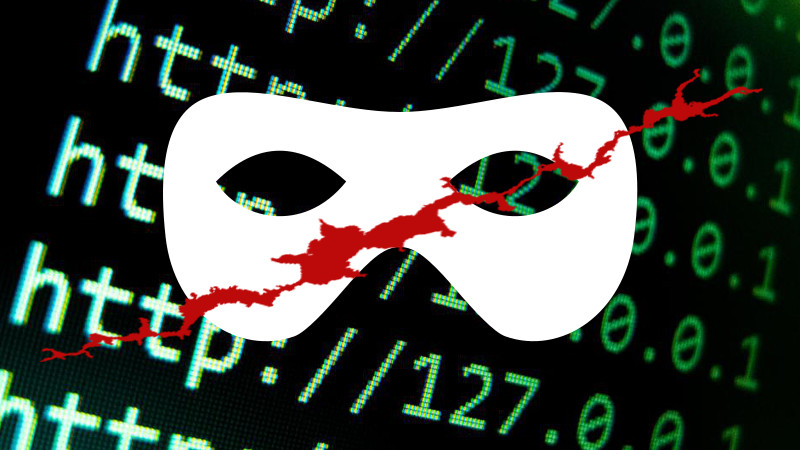
The Kremlin is officially cracking down on online anonymity. Images mixed by Tetyana Lokot.
Russia is now officially cracking down on anonymizing web services—tools that allow users to access content and websites that might be banned in the country. Roscomnadzor, Russia's Internet censor, has added the anonymizing service NoBlock to its blacklist registry.
The block came after a court in Anapa decreed the service could be used to access content that had earlier been added to the extremist materials list. The court decree from 13 April, 2015, says NoBlock would allow Internet users “to have full access to all banned websites through anonymous browsing and user IP masking.”
The same court in Anapa was quite busy in April, and banned two other anonymizers, with the respective decrees essentially carbon copies of the one above, but those websites have not yet been added to the Roscomnadzor-managed blocked websites registry. Several other Russian courts, including some in Bashkortostan and Dagestan, have also ruled to block anonymizers, but the court decrees do not reveal the specific addresses of the banned websites.
In May, RosKomSvoboda, a Russian Internet freedom and human rights organization, reported that the very same Anapa city court also ruled to block part of their website on the grounds that the page in question was an anonymizer. In fact, the section of the website owned by RosKomSvoboda only provided instructions on how to bypass geoblocking and access websites blacklisted in Russia.
It's worth noting that in almost all of the rulings, the court cited existing legislation not specific to Internet anonymization services, such as the law on extremism. Still, the fact that the court specified the term “anonymizer” as one of the premises for blocking the websites is cause for concern, since anonymizers, proxy-servers, and other similar tools are not explicitly prohibited in Russia.
Russian officials have debated restrictions on VPNs and anonymizers for quite a while. In 2013 Russian media reported that the Federal Security Service (FSB) was considering lobbying the State Duma with a bill banning “Tor and other anonymizing proxy servers,” but the idea never got out of committee. In February 2015, Leonid Levin, an MP heading the parliamentary committee on information policy and communications, suggested that access to anonymization and circumvention tools such as Tor, VPNs, and proxy-servers needed to be restricted.
In 2014, the Russian Interior Ministry offered almost 4 million rubles (about USD $100,000) to anyone who could devise a way to decrypt data sent over the Tor network. Most recently, in July, Russian media reported that the Kremlin commissioned a study of “possibilities of influencing the development of the Russian segment of the Internet,” that included looking into methods of preventing anonymous activity online and developing ways of regulating and filtering information posted anonymously, analyzing encryption methods, and monitoring encrypted online traffic.
RuNet Echo's own analysis shows that Tor use has been on the uptick in Russia, ostensibly in response to the Kremlin's efforts to regulate or censor content online. Though a recent report by the UN Special Rapporteur on the Promotion and Protection of the Right to Freedom of Opinion and Expression recognizes encryption software and anonymizing tools as “essential to free speech,” the Kremlin seems to be eager to curtail the use of the software that facilitates anonymity and free expression online.



